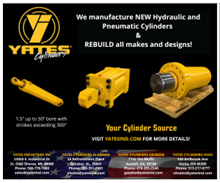EUROFER: EU Trade Policy Needs to Become More Reactive and Effective
01/01/2015 - Securing an international level playing field has become increasingly challenging, EUROFER says: Free Trade Agreement (FTA) negotiations with major emerging, resource-rich economies are not concluded while protectionist measures are cumulating in all steel regions of the world outside the EU.
“The EU steel industry depends on open markets and fair trade. However, since the global crisis, the proliferation of unfair trade practices by non-EU steel producing countries is undermining the level playing field for EU steel producers increasingly weakening their margins,” said EUROFER director general Axel Eggert. “For Europe to keep its global leadership in this strategic sector with hundreds of thousand highly skilled employees, trade policy needs to be reactive and effective, forcefully tackling third market access and raw material export restrictions, and enforcing the EU’s trade remedy instruments without inhibition against unfair trade practices.”
The only moderate rebound in EU steel demand so far this year — estimated to have grown by about 4% over the first three quarters of 2014 — has been largely absorbed by imports. Owing to finished steel imports rising by 22% over this period, domestic deliveries by EU mills increased only by around 1.5%: EU mills are losing market share to steel suppliers from abroad. At the same time margins of steelmakers in third countries are protected by domestic policies.
“How much longer has the EU steel industry to face worsening unfair competition worldwide?” Eggert asks. ”The EU could use more the weight of its own vast domestic market in tackling third country market protectionism. Leverage towards third countries is critical for the EU, notably in domains where WTO disciplines and enforcement are weak such as subsidies and raw material restrictions.”
Member states should support the Commission’s proposal on the modernization of the EU trade remedy instruments to swiftly update the basic Anti-Dumping and Anti-Subsidy Regulations, inter alia allowing the imposition of duties which better reflect the real injury caused to European industry (EU’s “lesser duty” rule).
In particular, the EU should not give Market Economy Status (MES) to China as China’s economy as a whole does not function on free market terms; the country does not meet the EU technical criteria.
Steel is 100% recyclable, over and over again, without loss of its unique properties — a permanent material for today´s and future generations. STEEL MADE IN EUROPE is essential. The EU steel industry plays a vital role in many of Europe´s strategic supply chains. It offers value added products and services developed in close cooperation with its customers to create a stronger, lighter and more sustainable world. EUROFER, the European Steel Association, represents almost 100% of “steel made in EU”, combining a turnover of approximately €166 billion — a share of 1.3% in the EU’s GDP. At more than 500 steel production and processing sites in 24 EU member states we provide direct employment for 335 thousand people and indirect employment for millions of European citizens.
The only moderate rebound in EU steel demand so far this year — estimated to have grown by about 4% over the first three quarters of 2014 — has been largely absorbed by imports. Owing to finished steel imports rising by 22% over this period, domestic deliveries by EU mills increased only by around 1.5%: EU mills are losing market share to steel suppliers from abroad. At the same time margins of steelmakers in third countries are protected by domestic policies.
“How much longer has the EU steel industry to face worsening unfair competition worldwide?” Eggert asks. ”The EU could use more the weight of its own vast domestic market in tackling third country market protectionism. Leverage towards third countries is critical for the EU, notably in domains where WTO disciplines and enforcement are weak such as subsidies and raw material restrictions.”
Member states should support the Commission’s proposal on the modernization of the EU trade remedy instruments to swiftly update the basic Anti-Dumping and Anti-Subsidy Regulations, inter alia allowing the imposition of duties which better reflect the real injury caused to European industry (EU’s “lesser duty” rule).
In particular, the EU should not give Market Economy Status (MES) to China as China’s economy as a whole does not function on free market terms; the country does not meet the EU technical criteria.
Steel is 100% recyclable, over and over again, without loss of its unique properties — a permanent material for today´s and future generations. STEEL MADE IN EUROPE is essential. The EU steel industry plays a vital role in many of Europe´s strategic supply chains. It offers value added products and services developed in close cooperation with its customers to create a stronger, lighter and more sustainable world. EUROFER, the European Steel Association, represents almost 100% of “steel made in EU”, combining a turnover of approximately €166 billion — a share of 1.3% in the EU’s GDP. At more than 500 steel production and processing sites in 24 EU member states we provide direct employment for 335 thousand people and indirect employment for millions of European citizens.



.jpg?lang=en-US&ext=.jpg)
.gif?width=220&height=200&mediaprotectionhash=374c6b9a31f2b2fbfc7937391034efb46fd57feba997b9ad2ae9a0bd3d48329d&ext=.gif)

.gif?width=100&height=200&mediaprotectionhash=e2d5b15d68f84f22038524be6c58e5268d67b7f44494b544e29a8d53c5b959ba&ext=.gif)
